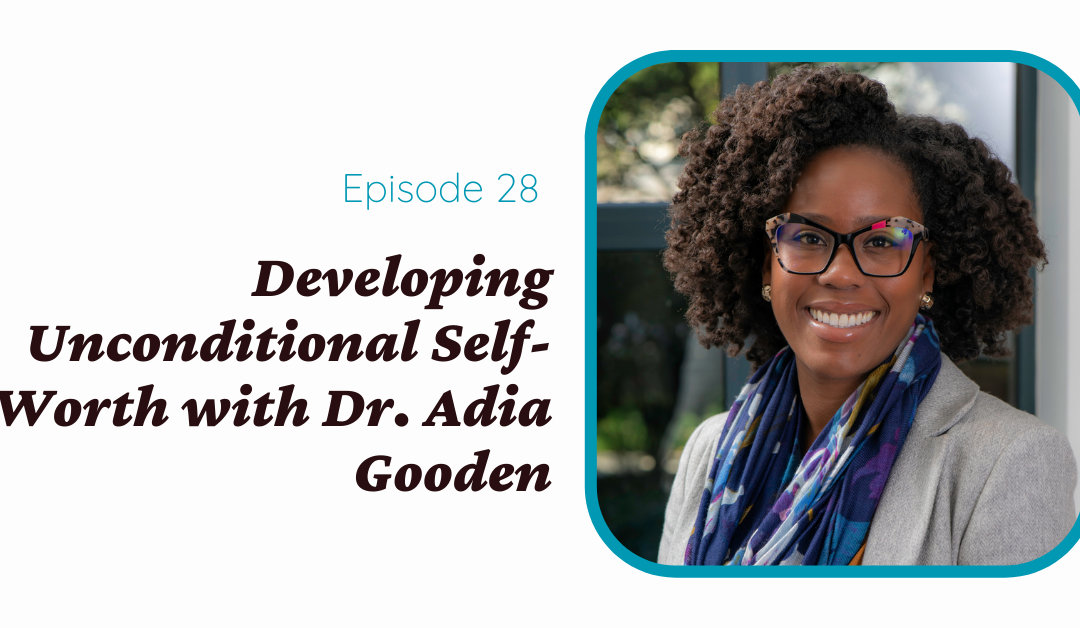Podcast: Play in new window | Download
Subscribe to The Innovative Therapist Podcast! Apple Podcasts | Spotify | RSS | More
Episode 28. This week I am incredibly excited to talk to Dr. Adia Gooden, PhD, all about how to develop unconditional self-worth.
This is a very important topic that frankly, all humans need to hear about.
I bet this isn’t the first time you’ve heard someone talk about the importance of valuing your worth. Maybe you’ve heard messages about cultivating self-love and compassion.
Maybe you even watched the Sturt Smalley SNL skit and tried saying affirmations to yourself. “I’m good enough. I’m smart enough. And doggone it, people like me!” (Video linked here for your viewing pleasure).
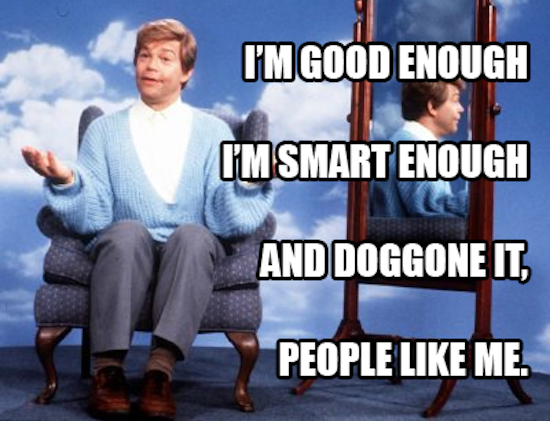
In all seriousness, Dr. Gooden has some amazing practical strategies you can start implementing today that just might change your life.
This conversation may just might be the difference that makes the difference for you.
Are You New Here?
Welcome! I’m so glad to have you. You might be wondering what this blog and podcast are all about.
We relate everything in this podcast back to motivation, but not the hustle and grind kind. Truly sustainable motivation that keeps you feeling energetic and engaged in your life for the long haul. We talk about why “I’m just not motivated” is a myth, and why the TYPE of motivation you have is so important to fully understand. If you are ready to learn about motivation and respecting your body in an effective way so that you can live a life you truly love, you are in the right place.
Check out the Foundational Episodes of the Motivation Made Podcast here!
- Introduction: What is this podcast all about?
- Episode 1: Want to Get & Stay Motivated? A Crash Course on Motivation, Weight Loss, and Health
- Episode 2: How Dieting Steals Our Motivation
- Episode 3: How To Get Motivated To Improve Your Health (Motivation 101)
- Episode 4: How to Transform Health Fears Into Forward Progress
“I’m terrified I’m wasting my life.”
I wrote this in a journal in the middle of the diet-binge cycle. And frankly, I kind of was.
I’m here to tell you it’s never too late to gain control of your eating, respect your body, and live a life that’s TRULY consistent with your values. But you need to take the first step.
One of the very first steps in developing truly autonomous and body respecting motivation is to clarify what actually matters to you. Not your mom, not your sister, not your best friend, YOU.
The more you reflect on this, the more you can connect your values to your behaviors in a sustainable and empowering way.
Grab the free guide at DrHondorp.com/goals and get started today. I promise you, it’s never to late to stop dieting and start truly living. You will not regret it.
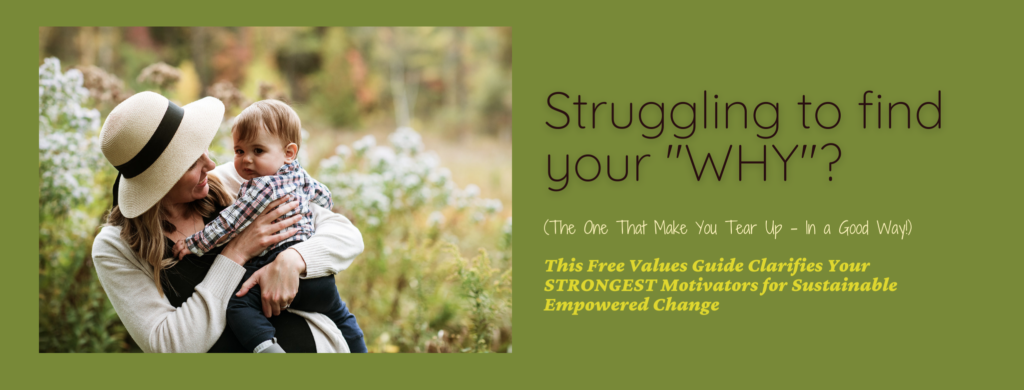
Introducing Dr. Adia Gooden, PhD, Your New Favorite Self-Worth Expert
Today I have the pleasure of talking with Dr. Adia Gooden. Dr. Gooden received her bachelor’s degree in Psychology from Stanford University and her PhD in Clinical Community Psychology from DePaul University.
She delivered an incredible Tedx Talk about Cultivating Unconditional Self-Worth. She left academia and became an entrepreneur and now has a top-rated podcast called Unconditionally Worthy and an online program that helps people discover the power of their unconditional self-worth.
She is a native of Southern California and resides in Chicago. Music and summer festivals spark immense joy in her life, and she loves cooking and dancing.
Welcome to the Motivation Made Easy podcast, Dr. Gooden!
Perfectionism: An Attempt to Defend Against Unworthiness
Dr. Gooden opens up about how struggles with self-worth manifested in her life growing up. She shares:
On the outside, things were great, but I often felt that I was unlovable and unworthy and I decided I needed to try to be perfect.
Dr. Adia Gooden
The Role of Comparative Suffering
This brings us back to what we learned in Episode 26 about comparative suffering. All pain is valid, no matter the circumstances, and no one benefits when we don’t acknowledge that pain.
Adia shares a significant event in her personal journey, which occurred moments after she delivered her dissertation defense. She immediately walked out the door and started crying.
She performed well enough to pass, but passing was not perfection, and even this incredibly high achievement wasn’t enough to make her feel proud or worthy of what she had accomplished.
External Validation of Worth Isn’t Sustainable
External validation of worth – be it a doctoral degree or losing 50 lbs – are common motivators.
Longing for approval and validations from others will always drive us.
It has likely driven many of your choices.
And yet, it is not a sustainable way to live. And many times, as Dr. Gooden found, it simply does not work.
Psychologists are Humans Too
Psychologists are taught that self-disclosure is, for the most part, off limits. But why?
This is heavily rooted in the fact that Psychology was founded by white, upper class, cisgender, straight men. There was this belief embedded in our society that we can be totally objective, and focus on treating people without building a relationship with them.
Psychologists are the experts. Patients or clients are the learners.
In reality, we are all just human beings.
Sharing our stories can be incredibly healing not only for ourselves, but for others as well. Coming together in commonality makes us feel less alone and inspires others to use their voices too.
How Self-Worth Relates Directly to Autonomy
Autonomy means freedom of choice without excessive pressure.
The idea that you know what’s best for you ultimately, once given the options.
What a shocking idea.
Dr. Gooden states it well:
And being in relationship to yourself relates to autonomy. It’s like letting go of these outside sources of expertise and really truly connecting to your own internal wisdom, your intuition, your values, how you want to show up for and with yourself that’s really powerful.
Dr. Adia Gooden, PhD
Retelling Your Story
We are making meaning all the time of the things that happen to us. When we are caught up in a negative headspace, we tend to be incredibly unfair towards ourselves, and interpret events as our fault, and to be a source of shame.
This is common, and even more common in response to trauma. AND, it’s incredibly important to become mindful of our stories and how we are interpreting and telling them.
Our story of shame and guilt about our history of trauma, emotional eating, and weight gain has the possibility to become one of resilience and triumph. Of learning to forgive ourselves for being imperfect humans who do things we’d rather just forget, and instead embracing our imperfections as beautiful aspects of who we are.
How Does This Relate to Your Relationship with Food?
First and foremost, it’s important to acknowledge your privilege.
Dr. Gooden introduces the term “size privilege” as an alternative to “thin privilege”.
In today’s society, people deem certain sizes more worthy and desirable than other sizes. Although it is important to acknowledge struggles with body image at every size, it is just as important to recognize that larger bodies are constantly criticized and underrepresented in the media, and society continues to praise and cater to smaller bodies more.
There are many ways that society feeds us doubt about our bodies if we weigh more, and how this can easily lead to feelings of unworthiness. It is incredibly damaging, as the lower self-worth often caused by diet culture and weight stigma feeds into further desire to diet and repeat the cycle (in which the most likely outcome is weight gain).
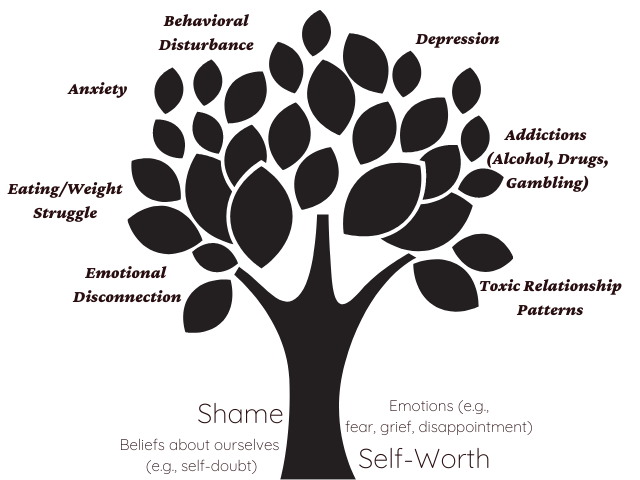
Dr. Gooden actively helps us work on the roots of the tree. The roots keep us grounded, and the strength of the roots determine how the branches and leaves grow and hold up over time.
“I Need to Improve My Self-Worth Before I Can be Vulnerable.”
Dr. Gooden talks about how practicing self-compassion first can set us up for success. It may be rewarding to practice this before feeling the vulnerability that comes with taking big risks or striving to achieve our most important and desired goals.
However, it’s also important to realize that we will never be perfectly grounded in our self-worth. It’s a process, and that’s okay.
The analogy of a child learning to swim is relevant here: You will gradually get better by practicing, and that will improve your confidence over time, leading you to work on it more and more.
An Evolution of Self-Worth
You can work on yourself and your worth while gradually pursuing things you value.
Learning to cultivate better self-worth takes time, and it’s not a perfect science. It isn’t something that we should look to achieve, but rather something to always be intentional about, and always be open to improving. Baby steps.
With that being said, we can’t get stuck in the idea of perfectionism. What we do in our own lives is our decision, and we should never avoid doing things that feel valuable to us.
It is completely okay to simultaneously work on self-worth and pursue difficult things that could lead to more fulfillment in life. Through doing hard things, we acquire the tools needed to lift ourselves up when we feel like quitting. It’s all gradual, and we’re all on our own time.
Common Barriers to Unconditional Self-Worth
Perfectionism. Be careful not to characterize unconditional self-worth as an achievement, or turn it into something that can be done right or wrong. This mindset can easily lead to fear of starting due to fear of failing.
Not Connecting to Values. Make sure you are taking time and space to connect to your values, and ensure you are not avoiding what’s truly important to you.
Giving in to Societal Obligations. We talked about how so much of our world is in a finite mindset, and how there is too much emphasis on right and wrong. When we place too much value in “shoulds”, we are seeking worth from others rather than from ourselves. It is important to do what serves us most, not what society deems appropriate.
Too Much Emphasis on the End Goal. You are never going to be perfect, but you can begin to feel confident that you have the tools to respond to your self-talk in a more caring way.
The Power of Self-Compassion
Dr. Gooden talks about how helpful self-compassion is in developing confidence and self-worth. This could mean caring for yourself the way you would care for a family member in need, treating your body with kindness, or giving yourself space to reflect and recharge.
She describes self-criticism as self-abandonment. You already made a mistake, so why beat yourself up about it?
Self-Compassion in Response to Fullness
Say you ate a large meal and you’re feeling overly full, and this has led to feelings of shame and guilt.
How can you be there for yourself?
You feel awful, but you tell yourself “It’s okay, I’m here for you, and I forgive you”. You show up for yourself.
If that feels too difficult, imagine how you would care for a small child or a puppy if they were frightened by something. “I know that was scary, I’ve got you.”
You’re treating yourself with kindness and embracing your worth, even though there was a perceived mistake or failure. You’re reminding yourself that you don’t have to be perfect, but your feelings are valid.
Self-compassion not only helps to improve self-worth, but It also calms your nervous system down and re-activates your pre-frontal cortex, leading to clearer thoughts and better decision making.
This one is important for our science folks. It’s effective at a biological level!
Will Self-Compassion Make Me Complacent?
Some of it is societal pressure. We’re told that if we focus on our own needs too much we could risk becoming too self-involved, and that the most redeeming qualities in a person are rooted in serving others instead of ourselves. We are constantly fed the idea that we have to tear ourselves down when we make mistakes in order to avoid becoming complacent.
But the reality is, practicing self-compassion is embracing vulnerability. It can feel easier to be hard on ourselves, even though by doing so we are actually intensifying the underlying issue. It leads us to avoid our negative feelings rather than face them.
It can feel so much more challenging to acknowledge feelings of deep disappointment, hurt, regret, or shame; but in the long run, it is immensely healing and rewarding.
“I’m not leaving you. You’re safe here.”
Imagine trusting your inner monologue to guide you when you’re feeling down, and forgiving yourself when things go south. Imagine telling yourself “I’m not going anywhere”, and finding comfort in that. Consider how powerful it could be to start truly transforming how you relate to yourself in this way.
Body Shame, External or Internal, is Incredibly Painful
The pain that results from assumptions about our bodies is incredibly painful. It hurts.
Just giving ourselves space and bearing witness to our pain is powerful and commendable. It takes a great deal of strength.
After embracing this step, we can start reminding ourselves of all of the things we do every day to take care of ourselves. Only WE know what we do for ourselves, and oftentimes this goes unrecognized because we get lost in the routine of our day-to-day lives. This could be practiced through thought and reflection, speaking aloud, or in the form of a list, and it’s important to note that it will never be perfect.
Intrinsic Motivation for Dance
Dr. Gooden describes her deep love of dance. She shares that it’s challenging, incredibly exhilarating, and it makes her feel alive. It’s her outlet. She loves the way it makes her feel so much that she decided to enroll in modern dance classes as an adult, and she is still dancing now.
Her emphasis on continuing dance purely due to the way it makes her feel is an example of intrinsic motivation. This type of motivation comes from within, and often takes some time and consistency to discover.
Integrated Motivation Example: How to Shift from a Should to a Choose To
Dr. Gooden talks about how she gradually incorporated meditation into her schedule more consistently. She received training in meditation in part of her program and had a lot of resistance to trying it.
Because she was forced to practice it and didn’t originally see any benefits, it was an externally motivated behavior. However, through facilitating meditation groups regularly, she stuck with it and eventually experienced the internal benefits that she didn’t receive in the beginning.
Now she does it most days, not because it’s required, but because she enjoys seeing the positive impacts it has on her mind and body.
Sometimes signing up for a class or program where you have to show up consistently can offer the accountability needed to stick with it and eventually find internal motivators to continue.
For activities with delayed gratification, structure can help you stay steady until you begin to see the intrinsic benefits of doing the behavior.
Connect with Dr. Gooden!
It’s time to shore up your unconditional self-worth, my friends. Connect with Dr. Adia Gooden on her website, on Facebook and/or on Instagram. Definitely listen to her podcast Unconditionally Worthy. She also has a free Ebook with 4 practices to connect to your unconditional self worth that you can grab here!
Top Things to Remember While Cultivating Unconditional Self-Worth
- You are under-utilizing the skill of self-compassion. I can almost 100% guarantee it. Instead of beating yourself up, or just taking a practical approach (“you messed up, don’t dwell on it, move on.”) you can name and make space for your pain, while still holding yourself accountable. You can talk to yourself as you would a small child who is in pain. “I see you, you’re okay. I got you.” This shift alone, when mastered, can change everything.
- Many of the ways we think about mental and emotional well-being are incredibly outdated. And often harmful when they further stigmatize struggle and have groups of us pretending that we don’t struggle, while our clients do. In the field of psychology, the precedent is not to share, to be a blank slate, to be objective and a suggestion or advice dispensary. And yet, when we question that, not only can we help people more effectively, we as professionals can also be more free to bring our full selves to work. This relates to our discussion in Episode 27 about 4 Reasons you should share your story (and why I shared mine). The reality is, we aren’t going to fall into categories or checkboxes. This person has depression and self-worth issues, this one does not. This one has developed self-compassion, this one hasn’t. It’s a journey that we are all on and we ALL have shame and self-doubt. We can all work on and benefit from the skills mentioned here.
- The more you work on your relationship with yourself, the more you will be able to do vulnerable things, and pick yourself up when you inevitably fall. It does not need to be, “develop self-worth first, then do uncomfortable things,” OR “fake it until you make it, just do the hard thing no matter how you feel.” Your life is yours and yours alone. Don’t avoid things you value or get stuck in perfectionism, but don’t feel like you HAVE TO do something just because someone says so. You get to choose.
- External boundaries can help behaviors with delayed gratification to become more intrinsically motivating, under the right conditions. Dr. Gooden talks about her initial resistance to meditation, and how being forced to teach it and practice it allowed her to gradually see the benefits. This relates to how we can sometimes guide ourselves to an exercise routine or an eating pattern we might feel really good doing eventually, but in the short term might be super uncomfortable (e.g., if you are learning a new cooking or meal prep skill, or if you are working new parts of your brain or muscles). Setting up external boundaries sometimes can help create space to explore if the behavior truly fits in our life (e.g., do I feel good on a plant-based eating plan? What about partially plant-based?), particularly when we explore it without all the shame, blame, and guilt. Just truly an experiment.
You are NOT alone, there’s nothing wrong with you, and it’s not too late
Developing unconditional self-worth is a pivotal strategy. But understanding your WHY by clarifying your specific values is a pivotal part of developing autonomous motivation and building a life you love.
Grab this free guide to walk you through step by step and do it today! Give yourself the gift of moving towards showing up in the world from a place of worthiness and going after what’s most important to you, will ya?
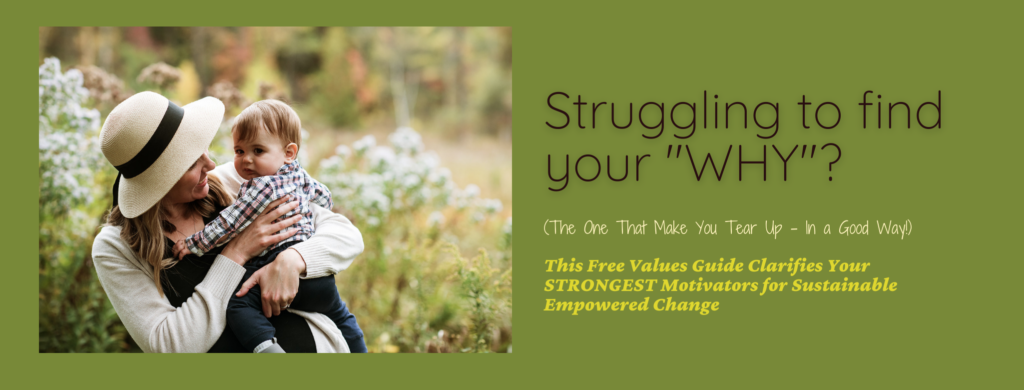
Disclaimer: This blog and podcast is for informational and educational purposes only. It is not a substitute for individual professional advice or treatment, including medical or mental health advice. It does not constitute a provider patient relationship.
Disclosure: Using the Bookshop.org links in this post means that I would get an affiliate fee if you purchase from the online bookshop (this supports my business, and local bookstores too!).
